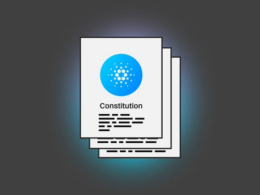Blockchain governance is broken in most networks. Voter’s participation is low, communication is scattered, and decisions are often made without real community input. Cardano, being the forward thinker that it is, decided to fix that.
DRep, short for Delegated Representative is a key player in Cardano’s on-chain governance. If you’ve been hearing this term and wondering what it means, you’re in the right place. Let’s break it down in simple terms so you fully understand its role, benefits, and importance.
What You Need to Know About DRep

A Delegated Representative is someone who votes on governance proposals on behalf of ADA holders. Instead of every individual ADA holder needing to vote, they can delegate their voting power to a DRep who represents their interests. Its like electing a representative in a democracy. Instead of voting on every single law yourself, you trust someone to make informed decisions on your behalf.
Governance in blockchain is all about making decisions, how the network evolves, what upgrades to implement, and how funds are managed. But let’s be real, not everyone has the time or knowledge to review every proposal. That’s where DReps step in.
Without DReps, many ADA holders wouldn’t participate in governance, important proposals might go unnoticed, and decision making would be slow and inefficient. With DReps, every ADA holder can have a say by choosing someone to vote for them, governance decisions are made by engaged, knowledgeable individuals, and Cardano’s future is shaped collectively and efficiently.
Anyone can become a DRep. You don’t need special qualifications, just a commitment to understanding governance proposals and voting responsibly. However, good DReps are usually informed, they research proposals before voting, and share their reasoning with the community.
The Silent Architect of Cardano’s Governance Revolution

Tempo is a platform aimed at improving community engagement and governance in the Cardano network. Its the megaphone for Cardano’s governance. It doesn’t just provide tools, it empowers DReps, DAOs, and SPOs to communicate, organize, and vote in a way that actually makes sense.
DReps (Delegated Representatives): Tempo lets DReps create profiles, showcase their voting history, and engage directly with the community. No more guessing who’s voting on your behalf.
DAOs (Decentralized Autonomous Organizations): If you’re running a DAO on Cardano, governance can feel like herding cats. Tempo brings structured voting, community discussions, and governance token integration to make decision making streamlined and actually decentralized.
SPOs (Stake Pool Operators): SPOs are the backbone of Cardano, securing the network and validating transactions. But staying connected with delegators is tough. Tempo bridges the gap, giving SPOs a direct way to engage with their community, share updates, and strengthen trust.
How DReps Work in the Cardano Ecosystem
ADA Holders Choose a DRep: ADA holders delegate their voting power to a trusted DRep instead of voting directly on proposals.
DReps Register and Build Their Reputation: Anyone can become a DRep, but they need to build trust by sharing their values, experience, and voting history.
Governance Proposals are Introduced: Proposals for network upgrades, funding, or policy changes are submitted for review and discussion.
DReps Analyze Proposals: DReps research, engage with the community, and assess the impact of each proposal before voting.
DReps Vote on Behalf of Delegators: When the voting period starts, DReps cast votes based on their own analysis or the interests of those who delegated to them.
Decisions are Finalized: Once voting ends, the results determine whether a proposal is approved, rejected, or modified for further discussion.
ADA Holders Can Reassign Their Vote: If an ADA holder loses trust in their DRep, they can redelegate their voting power to someone else at any time.
Benefits of DReps in the Cardano Ecosystem

- ADA holders can influence governance without needing to vote on every proposal, making it easier for more people to get involved.
- DReps are expected to research, analyze, and discuss proposals before voting, leading to better governance outcomes.
- Voting records and DRep profiles help ADA holders see who they are trusting, making governance more open and reliable.
- Instead of a few big players making decisions, power is spread across multiple representatives, keeping Cardano truly decentralized.
- Instead of thousands of ADA holders reviewing every proposal, DReps streamline the process, ensuring faster and more effective decision making.
- If an ADA holder disagrees with their DRep’s choices, they can redelegate their voting power at any time.
- A well functioning DRep system leads to stronger governance, making Cardano more sustainable, scalable, and community driven.
Tempo’s Impact on Cardano
Tempo is helping build a stronger, more engaged, and transparent Cardano by ensuring that every stakeholder, from small ADA holders to big DAOs to have a say in where the network is headed. And in a space where true decentralization is still a dream for most blockchains, Cardano is proving that governance doesn’t have to be chaotic. With Tempo, it can be structured, and fair.
Tempo is not an ordinary governance tool, it’s the infrastructure that makes decentralized governance work. It’s turning passive ADA holders into engaged voters, transforming DAOs from scattered groups into structured organizations, and giving SPOs a way to build real trust with their delegators.
DReps are important part of Cardano’s governance system. They make sure decisions are well informed, decentralized, and efficient. If you hold ADA, you should consider delegating your voting power to a DRep who aligns with your values. And if you’re passionate about governance, why not become a DRep yourself.










